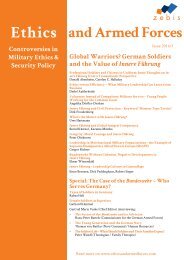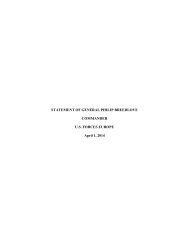FULLTEXT01
FULLTEXT01
FULLTEXT01
You also want an ePaper? Increase the reach of your titles
YUMPU automatically turns print PDFs into web optimized ePapers that Google loves.
TACTICAL THOUGHT<br />
2014 September 29 th<br />
Callwell underlines a “great diversity in tactics and strategy in different Small wars and<br />
different Guerrilla wars” 279 and regarding Intelligence; “The vital importance of<br />
understanding the enemy and the war to embark” 280, however, Callwell recognizes,<br />
echoing several contemporary statements; “Despite Intelligence work …in Small wars<br />
the regular forces are often working very much in the dark” 281 A view of complexity is<br />
also to be noticed; “So different conditions….actions ”282 “It is this extraordinary<br />
diversity of conditions which makes the consideration of small wars so complex and so<br />
difficult to discuss as one general subject” 283<br />
Result and conclusions<br />
The descriptions are of both an umbrella and explanatory character. The potential of<br />
explaining content covers aspects such as strategy, but the focus is on tactics. Fighting<br />
power factors are covered for physical, conceptual factors and moral factors. The<br />
description covers several characteristics and attitude aspects as not directly included.<br />
Participating actors are described both for the regulars and the irregulars. The<br />
description leans primarily on a military focus of the phenomena. The descriptions are<br />
clear and substantial in content and have potential understanding without<br />
complementary sub-explanations or definitions. Although from the 19 th century, a<br />
comprehensive content is outlined, which, in more modern words, could well be a<br />
contemporary discussion on “Irregular Warfare” from the military part of operations.<br />
Thomas Edward Lawrence<br />
Thomas Edward Lawrence’s personal accounts and despatches from the Arab revolt<br />
cover the period of 1918-1919 and were written in 1921. The epos Seven Pillars of<br />
Wisdom 284 has become an unmatched and unique classic concerning Irregular wars seen<br />
from a westerner’s eye, from the actual time period. The book covers 661 pages,<br />
appendixes excluded, and is a personal narrative, not pretending to be impartial. 285<br />
Lawrence uses the terms regulars 286 and irregulars. 287 He also equates rebellion with the<br />
form of an Irregular war, a term he uses; “the Sheriff’s rebellion had been unsatisfactory<br />
for the last moths: (standing still, which, with an Irregular War, was the prelude to<br />
disaster)” 288 Lawrence also uses the term “Guerrilla Warfare” and “mobile columns”,<br />
the latter of regular character. 289 A character of the “irregulars”, not suited for combat in<br />
larger formations, instead the smaller the better, is described. 290<br />
279 Callwell, Small Wars: Their Principles and Practice (1996), p. 23.<br />
280 Ibid. p. 33.<br />
281 Ibid. p. 43.<br />
282 Ibid. p. 43.<br />
283 Ibid. p. 42.<br />
284 Thomas Edward Lawrence, Seven Pillars of Wisdom. A Triumph (Norwalk, CT: The Easton<br />
Press, 1926/1935; New York: Anchor, Imprint of Random House, 1991).<br />
285 Ibid. p. 6.<br />
286 Ibid. p. 65; “Arab regulars”<br />
287 Ibid. p. 137.<br />
288 Ibid. p. 67.<br />
289 Ibid. p. 104.<br />
290 Ibid. p. 136.<br />
27





